Do you need a degree specific to Interior Design?
Of course it helps but I did not.
I own a successful firm. I hire new grads- have two right now whom I adore- but you think their schooling, both at prestigious design schools, taught them how to be a designer? Ask them- after a short time working for us they understand quite well school prepared them with TECHNICAL skills and a general body of knowledge and their experience is what will actually teach them the tenets of design- further- experience teaches you how to handle people and listen to understand their wants versus their needs and how to solve their problems.
Education is important especially for the younger set- but what about people who have successful careers in related fields?
Experience is the best education- it teaches you how to handle the execution of design which honestly is far far more important than being able to draw perspectives.
But going to school for the study of design is still the first route to consider
I am not knocking schooling- or the hard hard work many programs contain- that is why I hire graduates of good programs- being educated in design is excellent, but it has nothing to do with one’s abilities or prediction of their success. Many many fabulous designers did not go to school- I would encourage anyone with an interest in design to carefully consider all the pros and cons.
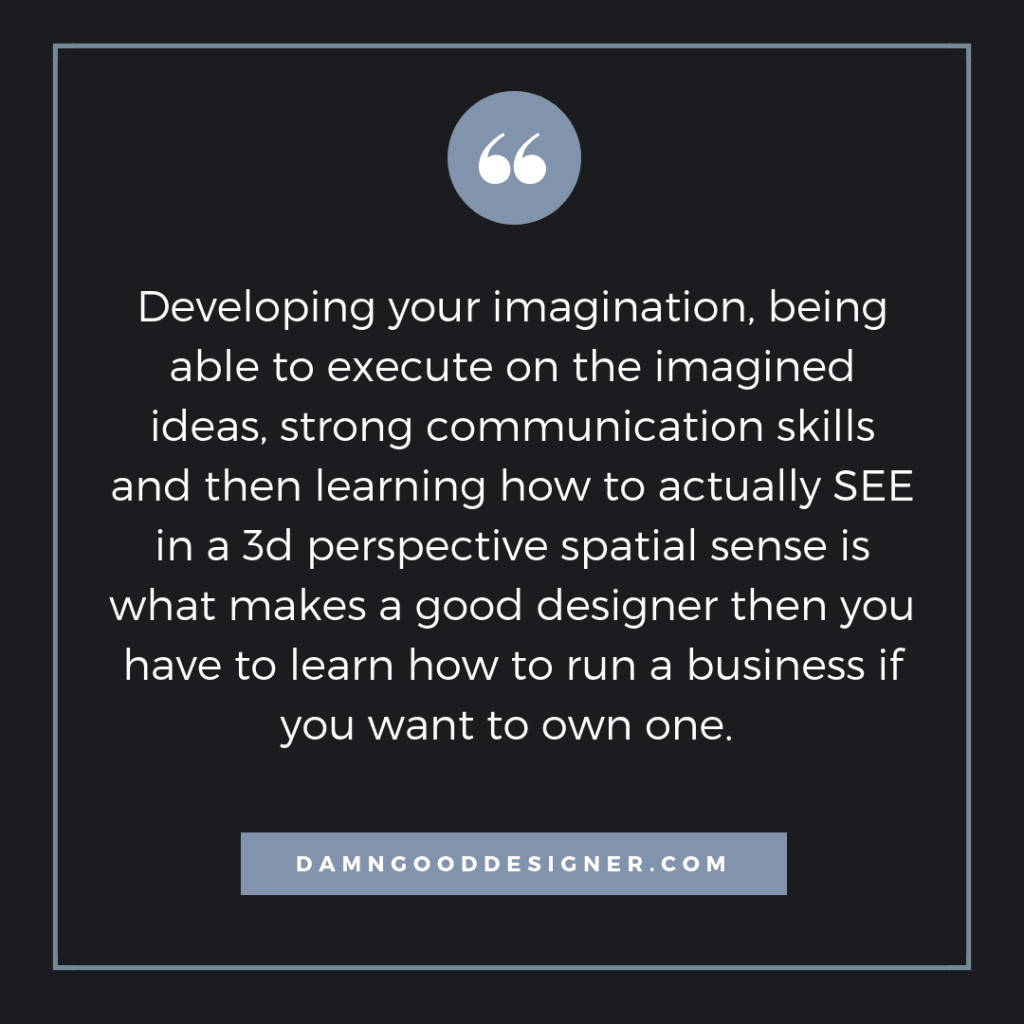
But this is 2019 and the idea of just pursuing only one dream in your life is a quaint notion at best these days. And I love it. Love the idea you can reinvent yourself and so something you feel a burning passion for whether it is going to law school, buying a franchise, running a lemonade stand on the beach or- becoming an interior designer or decorator as a second act or even as Scene 1 but maybe you have started down the adulting path and cannot stop the merry go round for a 4 year degree.
You CAN translate many of the skills you have gained in other fields to interior design.
But the burning question always seems to be how do you get from A- the desire and passion to Z- the actual designer who has gainful employment or a viable business?
I have spoken a lot about the sing a long songs of far too many consultants who exhort you to “raise your rates”- “charge what you are worth”- and all the other pizizzle that helps one become a popular coach or consultant or just a rah rah sis boom bah cheerleader- everyone loves a cheerleader right?
Good thing I am not gunning to win any popularity contests, eh?
Here is the thing for me. I want everyone to make piles of cash. Take a bath in hundred dollar bills. Buy everyone a car. Living the life! BUT- raising your rates and focusing on how much you need charge for this project or that project when you are still taking baby steps- is just putting the cart before the horse. There is so much more to learn-from a BUSINESS stand point as well as HONING YOUR CRAFT.
Ok so let’s say you either have the entrepreneurial passion and are itching to start on your own or have been working at it as a side hustle for a while and want to get more serious so you can ditch the day job.
What’s next?
First- let’s hope you have some savings or you have a spousal unit who can help until you have gotten further down the path. If not see “my best advice” below and think long and hard about doing anything you can to further your experience.
Because it is rough starting out ya’ll and that is just a reality check- But you can do it. I did it. Not always easy but here I am today.
Let’s talk about some of the ways you can further your goals without having a design degree
Best and top advice- Find a position with a firm and learn everything you can and give it your all like you were in school.
We have graduated many awesome designers who worked for a time then went out on their own. This really is the best way to start- but even then someone like me would look for some experience in a related field- but it can be any related field- construction, retail furnishings, a window treatment shop, even real estate can give you some solid experience to get a job to further your knowledge.
Other ways to hone your craft and improve skills without design school
These work on your own or as an employee of a firm- but is good advice for anyone.
1. Create your own education path or continuing education
This is key. You cannot just start doing design work with no background. You will be in over your head in no time. So look for seminars, short courses, self taught study or any classes you can take. Some of my preferred are listed below!
The Design Paradigm is the only comprehensive hybrid one on one and group coaching program for interior designers looking to master the art of pricing, positioning and the profitability of a win/win creative design firm. The NKBA has online seminars and other self study and while I think there is far more experience you need to tackle kitchens and baths- this is a great place to start if you are brand new.
2. Go on any factory visits you can- furniture, appliances, plumbing
You will learn so much. I have been on at least 50 and LOVED them all. Eventually manufacturers might pay you to go to! But even if is local place- it does not matter who it is – just learning about how things are made or work will elevate your conscious to a new level and help your education in this field tremendously. I credit many of the places I went early in my career for my success in kitchen design for sure. And- I ask a lot of questions!
3. Visit every museum you possibly can, but especially art museums
Look for beauty in other forms, look for pattern and texture in art. Get a good Art History book and read it. I credit my background in art to informing my sensibilities and “eye” for color, pattern, light and texture. Ask yourself as a lesson- why a certain piece appeals to you- write it down – understand it and be able to articulate the why- this comes in handy when you need to tell a client why a particular combination works. Read more about color, pattern and light here.
4. Study form and substance in nature- and photograph what you observe
Again may sound silly but take your phone and snap cool shots with great composition that appeals to you- this helps develop your eye also (and comes in super handy later when styling for photo shoots!) and creates a mindfulness of putting elements together to create a pleasing viewpoint. It works- promise you- and if you ever take any courses with me for entry level design this will be part of it! 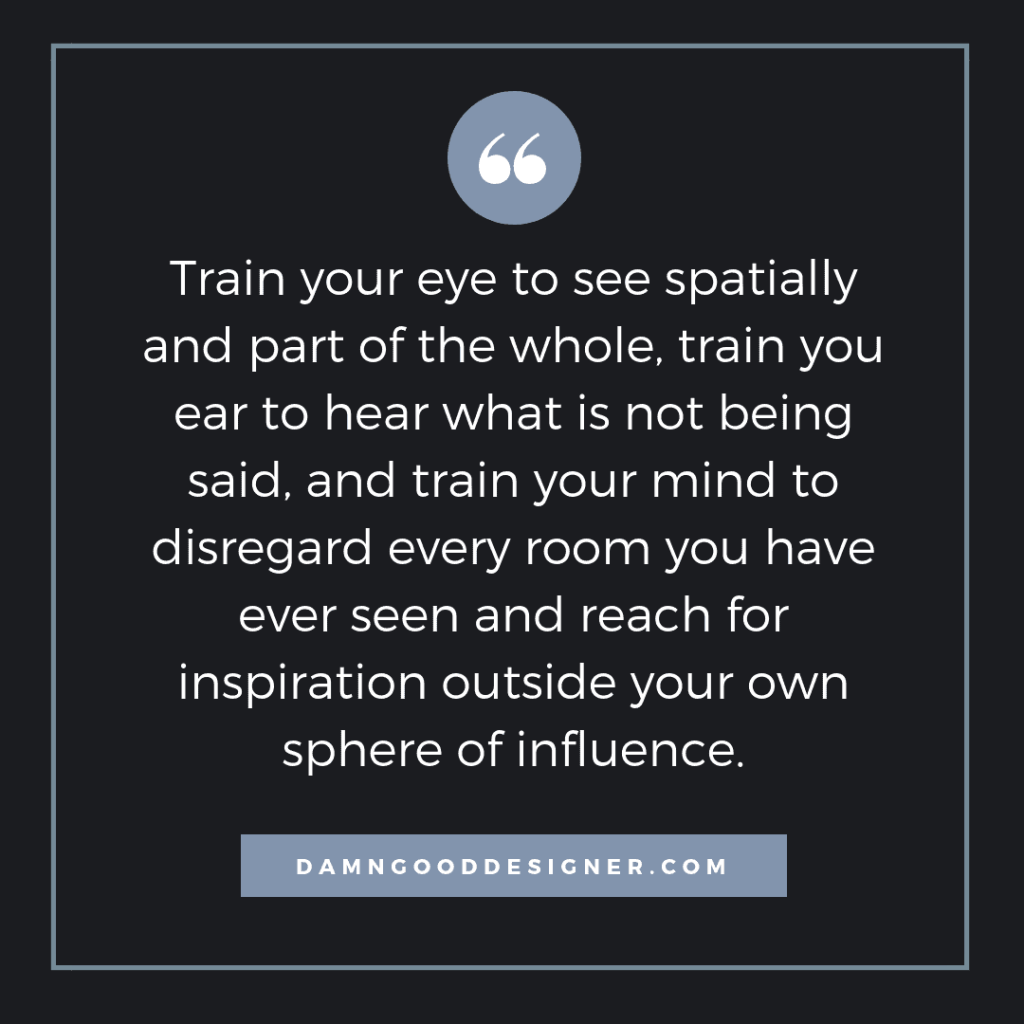
5. Go to Markets, KBIS and any other conferences you can afford and network like crazy- surround yourself with creatives
Some are better than others- make sure you know and ask questions. But these places afford you an opportunity to network, meet vendors, ask questions, and learn real life skills. Read the book- Never eat alone.
6. Listen to Podcasts and consider mentoring
I have mixed feelings on this as launching some small scale consulting myself- but I think some are out there to get your money. I have seen “coaches” come and go very fast and then turn up elsewhere coaching a different industry. So vet the coach or mentor carefully- make sure you really are consulting with someone you think can help advance your goals. For example- I would not be one to consult with if doing commercial design because I do not do it often enough. Just be cautious as the smoke and mirrors we contend with today can be misleading. Just because one has owned a business does not make them credible coaches in my opinion.
A couple of good people I know personally-
Veronica is a talented designer and is working in the field successfully. Many you see- are not and have not in a while. Veronica is the real deal and have never met someone so hardworking as this woman- super bright and talented.
https://www.veronicasolomon.design/
Claire has done very well in video- inspiring and down to earth. Her business model is different than mine, but I am sure she also has less stress too!
Podcasts are great too! I have my own, which you can find link for below. But just know that sometimes the advice is not always for your specific business and need to gauge what is best for your business model. You should listen to many to get a good well-rounded outlook, but there are many out there. Some good ones (including our own!) and Wingnut also has a podcast. (See below.)
Interested in learning how to build a successful interior design business? Join Cheryl and Liz in their no-nonsense and thought-provoking podcast, the Damn Good Designer. Click here to listen on Audible! Spotify, Apple, or Youtube.
7. Take classes for technical skills like drawing- or a class at Home Depot on setting tile or something else hands on- this is invaluable- trust me
Impress clients with your hands on knowledge too! How many designers can install a faucet or set tile? And it is key if you do not outsource- to learn one of the many drawing programs out there if you cannot draw now. Learning programs is essential but does not replace the creative pursuits above- those exercises will hone your eye and your skills. But there are even free places to download software like Draft site.
8. Travel as often as you can but also travel a different path
I mean literally. A great brain exercise is to get out of your daily rut. Go a different way to work or home. Go to a different grocery store that you are used to visiting. Travel to anywhere and keep your mind open and you will learn much. Sounds crazy? It helps you see new stimulus- helps creativity- and will get your blood moving. Get a Starbucks mocha lite for company.
If you can travel further away- do it! Keep a travel diary related to design and you will be surprised how it will help you “see” things as a designer should see things- through a lens of color, pattern, texture and light.
9. Read. Then read some more.
Some of my favorite books- Do the Work, The E-myth series, Rocket Fuel, Never eat alone, anything buy Gary V or Seth Godin- they are masterful.
10. Learn as much as you can about marketing – and preferably guerilla marketing- it is not the same as advertising
A couple of good Facebook groups-
Of course my own:) We do have parameters set for acceptance as the others will as well. My background before design is marketing, sales and have a strong education in the arts. I love marketing in unusual methods and am pretty good at it. Take a look at our group Small Business Think Big and also some of the others here too. Veronica and Claire above also have super active groups.
We would love to have you in our group Small Business Think Big or what They Don’t Teach You in Design School –
What They Don’t Teach You in Design School
Wingnut Social – also have a pod cast!
11. Shadow a contractor, plumber, electrician and you will thank me later
Try every week to get out of your comfort zone and learn something technical about the industry- by doing. Talk to sub or a contractor about their work and shadow them for half a day. Differentiate yourself from other designers but also make yourself all that much more marketable to clients- you will also feel empowered and raising confidence is key to getting new clients. Buy them lunch though as you probably will drive them nuts with questions. Oh wait- that would be me!
12. Develop your critical thinking and problem solving skills.
I don’t have an answer to this one or how- but what you think you know is probably not all you need to know with problem solving- but being able to critically think is essential to this field even more so than some others that are more predictable- because there is nothing predictable about design, construction and running a small business. All I can say is – ASK WHY a lot and do not accept the status quo.
Hey, maybe this will be a course I develop! In all of my free time:)
13. Work on your “big picture thinking” outlook
This is for your future growth. Stop and consider where you want to be in 2 yrs, 5 yrs, 10 yrs.
Big picture thinking allows you to lead- even if you are a solo business owner. You will learn to size up situations considering many components, the people involved, the issues, the timing, the relationships at stake. Big picture thinking allows you to see things from your contractor’s viewpoint, your vendor’s viewpoint, and most importantly your client’s viewpoint. Looking beyond yourself is key to growing any business.
Big picture thinking allows you to forge new ground when the time has come. I say every day- “I hate forging new ground. I love forging new ground.” It is because it is hard sometimes to spend the energy to forge new ground but again is essential to your learning track to become a talented designer.
Embracing big picture thinking will help to keep you from being caught up in the mundane of daily life and work.
In other words keep your eye on the ball and think about what it will look like when you get to where you want to go.
Is any of this taught in school?- Perhaps some but after having so many interns and young designers in my employ I would say not all. These are ways others who may not have a formal education can become a better designer even without a single client. But ultimately what makes you call yourself a designer as a professional title is having people willing to pay you for your ideas and talent based on your experience and portfolio.
The free marketplace determines if a business will make it or not and the sad truth is many want an easy path and there just is not one in this business because you eventually have to be able to walk the talk.
And if you do not have the ability to strike out on your own- you know needing to pay the bills and all- but reading this thinking you really would be good in this field and want to be in this field—Look to work for someone else. BUT……
please oh sweet baby Jesus do not send a potential employer shots of your home with the words on the wall or say how good you are at design because you decorated your cousin’s wedding with cute mason jars and vintage stuff and that all your friends tell you so and oh boy we should be so lucky to have you-
Ya- it does happen. See my post about getting a job in the design field without any direct relatable experience:)
You can do this.
Now go out there and slay the dragons!



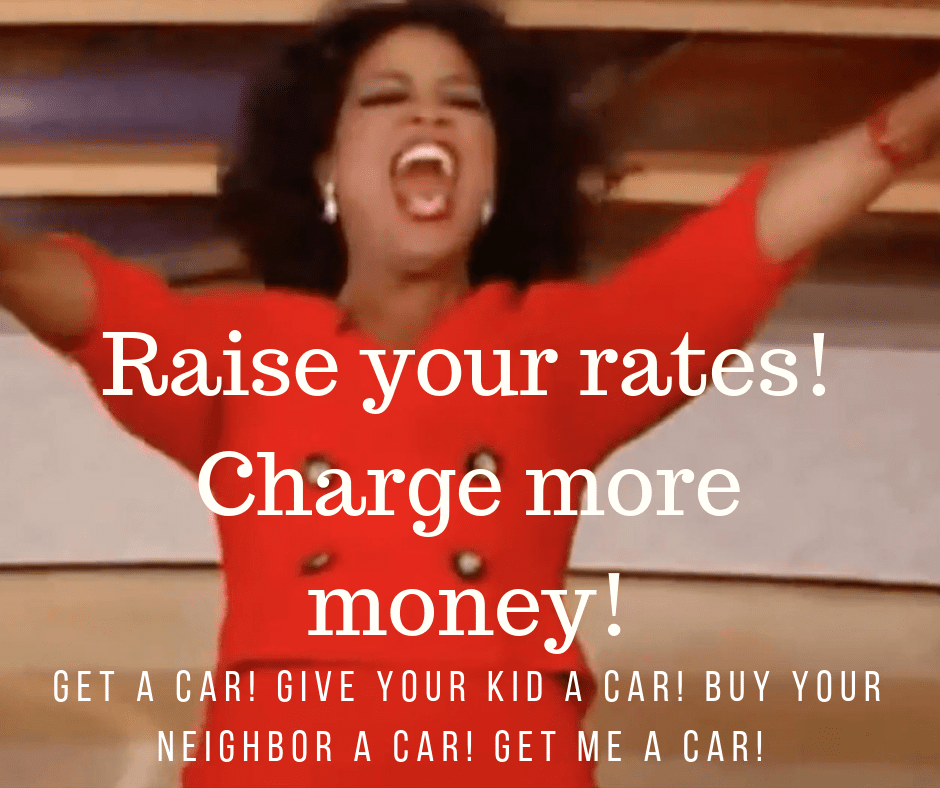
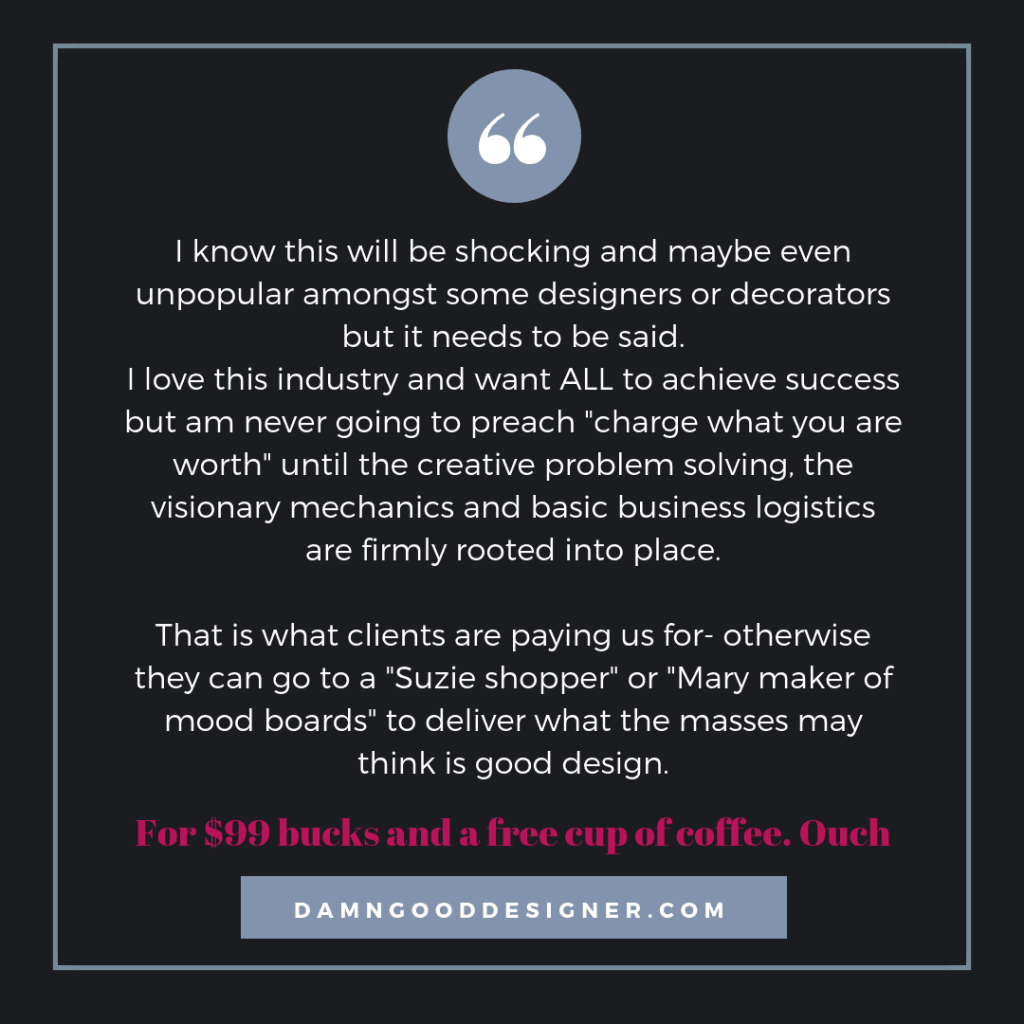
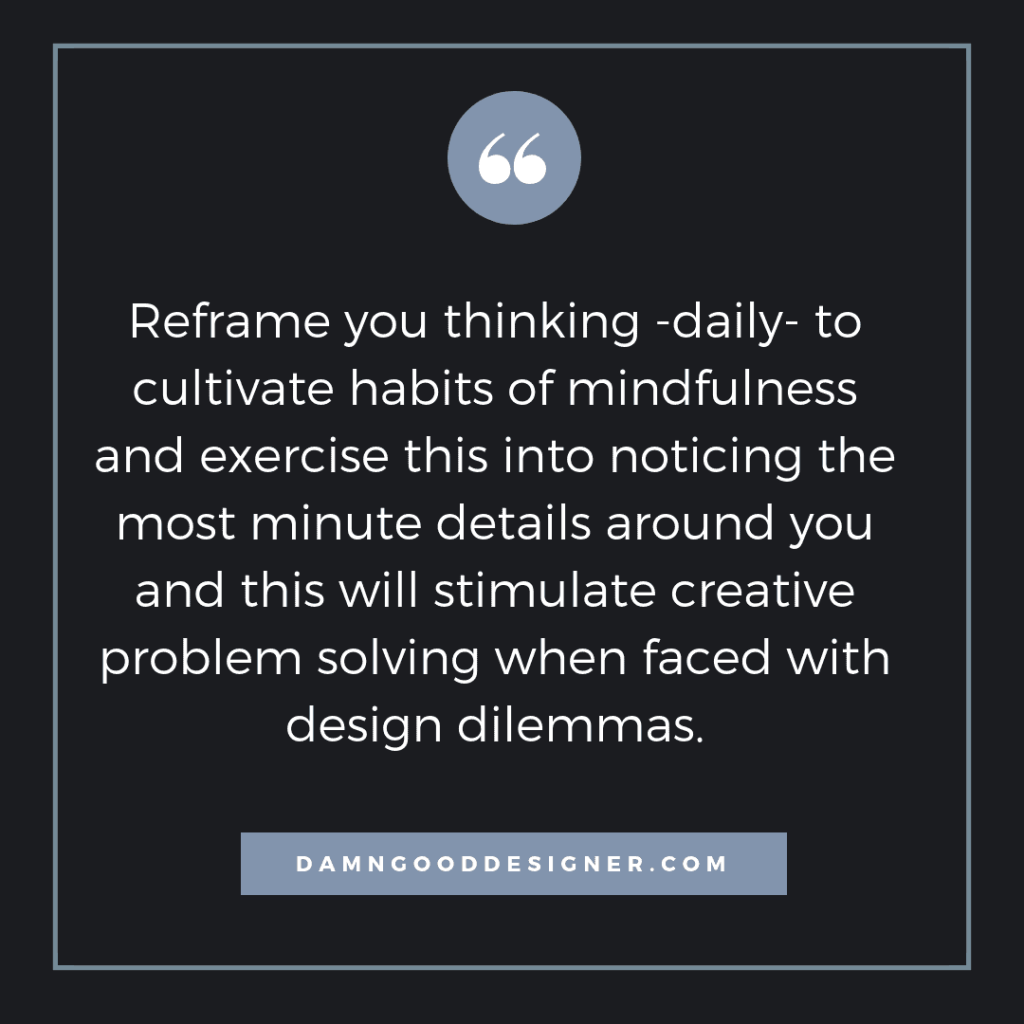

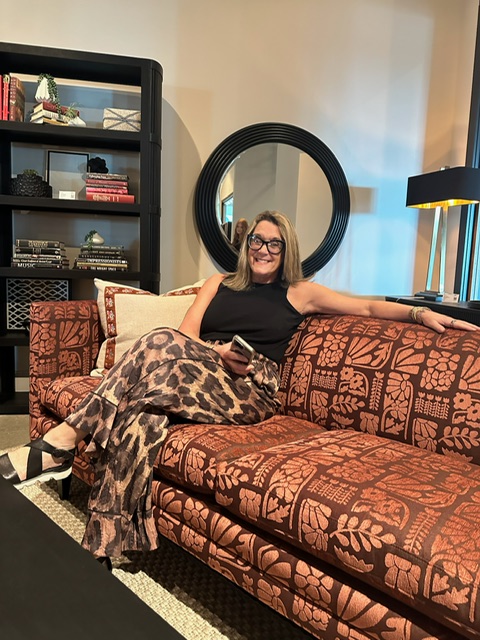

22 Responses
Oh wow! Just amazing! There is so much information and advice packed into this post. I agree with so many points. There is no easy way to success in this business, and real world education matters a lot! Love the suggestions of how to educate one’s self without a degree. Thanks for the mention as well. I look forward to seeing more of your wisdom on what it takes to run a successful design business and bringing great design to clients.
Thanks Veronica- Appreciate the comment!
Such a great and informative post! You have so so much to share!!! I will definitely make sure several new design grads I know read this
Suzie
Thanks Suzie- I think people get stuck sometimes on what to do “next”- Right?
Hi Cheryl!
Thanks so much for the link out to my Facebook Group: #DesignWealth. I really appreciate it.
There is a ton of great advice in this post for every aspiring designer, and I will be sharing it.
And thanks for the great business advice…. that I’ve learned from….in your own great Group: #SmallBusinessThinkBig!
Bookmarking this one to come back to over and over! Great advice!
Cheryl, another post filled with great information filled with so many ideas. Thanks for putting it all out there!
Awesome advice, Cheryl.
Will definitely work on a couple pointers like shadowing our trades, and or attending a class at Home Depot to really gain that confidence, of knowing a hands-on experience of laying tiles, and just observing, asking questions.
Thanks
Such good advice! I don’t have the formal degree. Before I started my design business, we remodeled a commercial building which I still own. And by we, I mean myself and my husband. We worked with the local building inspector and a licensed electrician and plumber to learn the codes and then we did most of the work under their supervision. Plus a million questions. I’m sure I was annoying. LOL I have built walls, put in insulation, hung wall board, tape and float, texturized, primed and painted all with my own two hands. Others do it MUCH better than me but I know what goes into it. I even built a cabinet and installed kitchen cabinets by myself (That was fun. Not. ) plus tiling, etc. It was a very good education and I am grateful now that we were so poor at the time and had to do it the hard way. I ran a successful childcare center from that building for 9 years and finally realized, “if I can make a business I knew nothing about when I started and make it a success, I can do the same thing for my design business for which I’ve been studying on my own all this time.” So I did. It’s been 9 years and I’ve never regretted doing it. It hasn’t been easy, but it has been worth it!
Fantastic post Cheryl! I always enjoy hearing your point of view my friend. I love that although we run our businesses very differently, we can appreciate and respect each other for running them successfully. Can’t wait to see you again at KBIS!
Bookmarking as well! Great post and great advice. I’m an MBA getting in to design and have some much to learn on the creative side!
Thanks for the shout out! 🙂
Great info Cheryl!
So much great information!! Will definitely be bookmarking!!
Well, I’m going to be the nay-sayer and disagree. Everyone is entitled to their own opinion of course, but as I see it, what you have described above is a great way to get into the art of interior decorating, and I respect and admire those who have the natural skill and nack for this independently without training. Keep in mind, however, that a formal education in interior design will teach more technical aspects as well as laying the framework for the art of design. It will teach you that there is absolutely a process for design (the same process that every architect follows). It will teach you how to understand the importance and relevance of a parti diagram and integrating this into your design concept. Without a degree, good luck getting a job at any firm that does commercial work in any way, shape or form.
Formal education in design is more of an “interior architectural design” degree, focusing more on building form, framing plans, working with engineers, HVAC consultants, etc. Going through the educational process will ensure that a designer is prepared to read and understand building code, as well as apply this knowledge to business practices and ethical design, understanding the difference between sustainable and ‘green’ and how to avoid greenwashing. I can write a blog post or read a book on each subject I studied in college, but it can never replace the hours of practice, research, and education from professionals who are trained in educating on this topic.
I had an intern for one year, and after one year, she asked me when she could be a “designer” rather than a “design assistant”. My answer… when you have a degree. There simply is no shortcut to quality design practices, and I would never recommend it.
As I said, however, this does not mean that one could not jump right into the world of interior decoration with the proper training, and I still highly recommend that anyone interested in starting a business (any business) be trained by a professional with experience. I wouldn’t wake up tomorrow and decide to be an electrician without proper licensing and certifications. The same goes for design.
POP QUIZ: What is the slip-rating coefficient required for an ADA ramp on flooring? Yup… you need to know this stuff!
I understand your position but with all due respect not everyone wants to be in commercial design. And yes it is hard to get a job in commercial without a specific degree.
That being said I will wager many of us know as much as you do about the technical end in residential. I know plenty and we Project manage our jobs as well much of the time. If I need to know a slip coefficient I will look it up. Not difficult. But we provide detailed specs for every price of tile or flooring we specify too. I have hired countless interior design graduates and many were awesome and some were not. They all though lacked any real knowledge of what a resisdential designer does every day. I have also hired super smart commercial designers who could not keep up the pace of residential nor had much creativity. Point being is all about the individual and to reduce all designers to “interior decorators” and not credit them for the experience they have is just silly. And of course there is nothing wrong with being an interior decorator anyway! But we do full plans- we understand residential and have no desire to do commercial. I respect education greatly but for me, the education I have prepared me to run a multi million dollar company and handle the business end- the rest of my skills came from experience. And if you note I do say clearly it is best to get the design education but it is not the only way to achieve the desired goals.
I do understand the technical ends of commercial are very important- and must be known. But honestly there is so much more than that technical skills to being good at design.
I agree with Rachel. You need the technical training if you are doing this for OTHERS. its the responsible thing to do. Period. Its irresponsible to tell other people this should be done for others without an education.
I disagree with you. I know many who have done it this way and I do not discount education at all. But for residential design it does not mean you need to have a degree in interior design. It helps. I have employed many over the years who did and they never made it. And some who did not who were very successful. Education is important regardless–but my contention is that it does not need to be in this field every time. It is based on individuals. It is not irresponsible thank you very much–I have been in business for 21 years–full time–with employees! That–is called experience and it trumps all.
Thank you for sharing it.
Point is the basis of what you are talking about is a sound and organized education to start out your endeavor of experience. Period. You did it that way but dont encourage people to skip formal education and go to musuems etc. Your route is not a normal one or the responsibly recommended one. Residential design is plenty complicated. Recommend people to go get the education before they mess someone up. I agree with Rachel.
Again you are entitled to your opinion. I stand by what I wrote and what I know. Many formally “educated” designers are no better than self educated ones. I do not discount formal education in any way. But for many, they can do quite well in residential design getting an education in other ways. Commercial needs more due to the type of work being performed. I design homes from the ground up–and do it quite well and have no formal degree in interior design. Experience is the best teacher always.